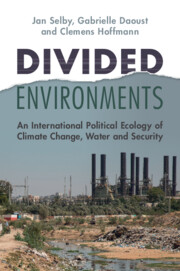8 - Peace
Published online by Cambridge University Press: 15 September 2022
Summary
One of the standard responses to eco-crisis and environmental security narratives is that the environment can be a source of cooperation as much as of conflict, of amity, not just of enmity. This chapter interrogates this liberal rejoinder to Malthusian and eco-pessimist reasoning. The chapter critiques functionalist and related accounts of peacemaking via water cooperation and argues that water is neither innately cooperation-inducing nor particularly important within peacemaking today. It shows, moreover, that because peace processes are themselves often deeply problematic – in extreme, reproducing or radicalising pre-peacemaking divisions and attendant patterns of conflict, appropriation and inequality – so the same applies to peacebuilding and cooperation relating specifically to water. These arguments are developed through analysis of the Israeli–Palestinian Oslo peace process, the Annan process on Cyprus and Sudan’s Comprehensive Peace Agreement. Water scarcities, the chapter shows, have not historically been a significant force for peace; by extension, it is argued in conclusion, climate change–induced scarcities are unlikely to have such effects either.
Keywords
- Type
- Chapter
- Information
- Divided EnvironmentsAn International Political Ecology of Climate Change, Water and Security, pp. 240 - 269Publisher: Cambridge University PressPrint publication year: 2022

